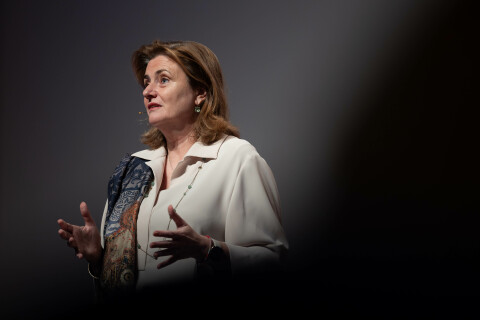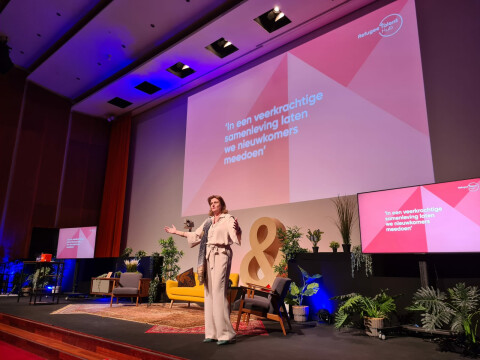
June 20th 2024
A resilient society
Karien van Gennip, Minister of Social Affairs and Employment, spoke at our public event. She challenged us all to hand out crates and tear down fences. I spoke to the minister digitally in advance. About how enriching diversity is, about talent and dreams. And about her drive to make a difference in society.
Please note: this article was translated using a translator appThe minister has been involved in social involvement from an early age; she was spoon-fed it. Her father was active in the field of development cooperation and international cooperation, among other things, her mother was involved in helping seniors remain active for longer. So there was plenty of inspiration at home to become politically active. Her personal motivation is to give people equal opportunities.
The best thing about politics? “That everyone has an incredible amount of passion for what they do. And that you can make a difference. Sometimes because of what you say, sometimes because of new policy, or because you get someone on board. That gives a lot of energy.”
About dreams
“A newcomer's dream is often that their child will have a better future. Own dreams are often given up. That touches me and I would like it if we gave those parents the feeling that they can dream again. Because we live in a country where we can dream.”
“My dream for the Netherlands is a country of connection. A resilient society that works for everyone. Where people hold each other together and build a better society together. And that – precisely because we have complete freedom – we continue to understand each other and each other's dreams.”
Integration is not easy
The minister knows from his own experience that integration is not easy. A few years ago, she chose to live in France with her family for a period. “I found it hard work to integrate. Despite all the help we had and the position we were in. It is an interesting balance that you try to find as a newcomer: how do you combine both cultures and maintain your own identity? That's quite complicated. And that was already quite difficult for me, even though I had chosen to live abroad. Of course, this cannot be compared to the experiences of people who had to flee.”
“As a newcomer in the Netherlands you need an enormous dose of motivation and perseverance to build your life, despite all the barriers that are presented to you once you get here. I've seen a lot of people struggle with that, and those are stories that stay with you. And they make you realize how valuable it is to have a network, to know the unwritten rules, to have a job.”
Value of work
“Work is so important for a person. It is essential for your integration. Work is the best dictionary, it gives self-confidence and pride, an income, a social network. And it's not just important for the newcomer. His new colleagues get to know a newcomer and notice that they have a lot to offer, that they are an enrichment because they bring different points of view. They are people with talent: professionals who were born somewhere else.”
“You only really see the added value of diversity when you work with someone who is different. This gives you different insights, you look differently and based on those different perspectives, you make better decisions as a team. It is important for our society that everyone sees that added value. We must all create society together. It is good that the 24-week rule has been abolished. The fact that you can participate more quickly benefits everyone: asylum seekers, employers and society.”

Society
The combination of politics and business interested the minister early on - and that is one of the things that appeal to her in her current role: “The passion and vision in politics is a very strong combination with the vision and implementation power of the business community. Together you can make a difference in society.” For example, the minister sees valuable initiatives for the labor market in various municipalities, in IT training, in healthcare and in the energy transition. “There is so much talent among newcomers; that talent must be utilized.”
As a society you need to get over your prejudices, she believes. “If everyone gets to know a few newcomers, you understand each other more. People are increasingly inclined to stay in their own bubble and judge 'the other' based on the group they think the other belongs to. This stands in the way of an open conversation.”
Integration is a two-way street
When I asked what the minister would like to give to employers and newcomers, she says: “If you invest in people, you will get a lot of return. Provide a diverse team, hire status holders, women who wish to become pregnant, people aged 55+, people with a non-Dutch sounding surname, someone with autism... Believe me: you will get an incredible amount of energy, passion, commitment and loyalty in return . And you enrich your team and your organization.”
“I would like to say to newcomers: invest in your relationship with this country. Integration is a two-way street : society must open its arms, and as a newcomer you must step in. Learn the language, get to know people, show interest, be curious. It will probably be disappointing at times, but don't be discouraged. Go for it!"
---
This article is part of the white paper that we will soon publish following the public event 'Big dreams start small'. Would you like to receive the whitepaper? Send us an email: info@refugeetalenthub.com